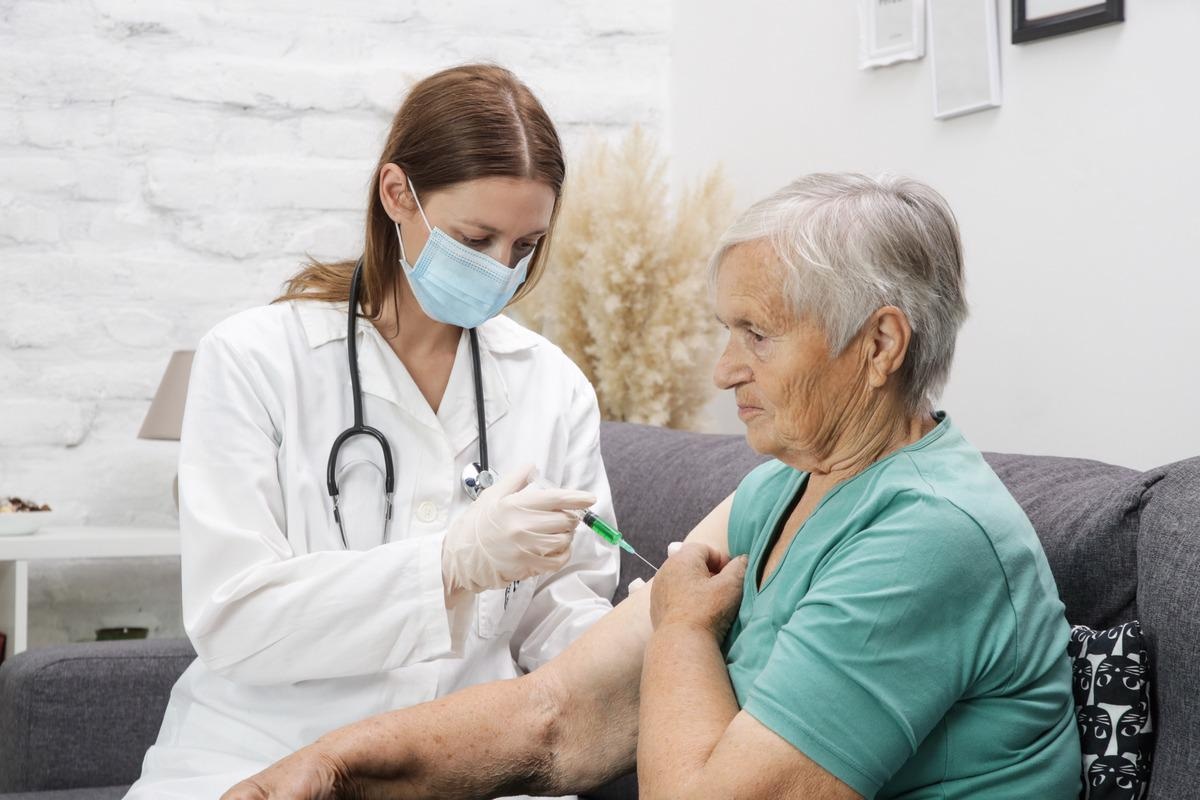The current coronavirus disease 2019 (COVID-19) pandemic has massively affected the global healthcare system and economy. This pandemic has been caused by the rapid outbreak of a novel coronavirus, namely, severe acute respiratory syndrome coronavirus-2 (SARS-CoV-2), which belongs to the family Coronaviridae. Scientists have stated that older age group, male sex, individuals with comorbidities, such as diabetes, and obesity, are at a higher risk of suffering from severe COVID-19 illness.
 Study: Safety and immunogenicity of a high-dose quadrivalent influenza vaccine administered concomitantly with a third dose of the mRNA-1273 SARS-CoV-2 vaccine in adults aged ≥65 years: a phase 2, randomised, open-label study. Image Credit: triocean/Shutterstock
Study: Safety and immunogenicity of a high-dose quadrivalent influenza vaccine administered concomitantly with a third dose of the mRNA-1273 SARS-CoV-2 vaccine in adults aged ≥65 years: a phase 2, randomised, open-label study. Image Credit: triocean/Shutterstock
SARS-CoV-2 vaccination
The rapid development of COVID-19 vaccination and the commencement of vaccination programs have reduced the death and hospitalization due to SARS-CoV-2. Many countries have vaccinated individuals 12 years or older with two doses (100 µg dose) of the mRNA-1273 vaccine. Recently, in light of the waning of vaccine-induced immune protection, many countries have devised a third COVID-19 booster dose (100 µg dose) for all individuals aged 18 years or over with severe immunosuppression.
Recently, the US Food and Drug Administration (FDA) Vaccines and Related Biological Products Advisory Committee and the US Centers for Disease Control and Prevention Advisory Committee on Immunization Practices’ (ACIP) have extended the eligibility for a 50 µg COVID-19 booster dose for all individuals who are at a high risk of exposure to SARS-CoV-2 infection. Individuals aged 65 years or above have also been made eligible for a COVID-19 booster dose. The available safety profile and immunogenicity data have revealed that the third dose of mRNA-1273, BNT162b2, and ChAdOx1 SARS-CoV-2 vaccines enhance the immune protection against COVID-19 infection.
Influenza vaccination
Previous studies have indicated that influenza causes acute respiratory ailment in various age groups. However, the older age groups are severely affected by the virus. Seasonal influenza vaccination has substantially reduced influenza-associated morbidity and mortality in groups at increased risk of complications. A high dose of influenza vaccine is typically used to protect individuals 65 years or older from influenza infection. According to a meta-analysis of multiple randomized and observational studies, a high-dose trivalent influenza vaccine was more effective in reducing clinical symptoms than a standard dose of influenza vaccine.
There is a risk of delay or disruption in the seasonal influenza vaccination campaign in the current pandemic. This is because of prioritizing COVID-19 vaccination, particularly in older adults, during the same period. The WHO and several countries have developed guidance on the concomitant administration of influenza and COVID-19 vaccines to sustain influenza vaccine uptake. Their main focus has been decreasing the number of visits to healthcare providers for vaccination, shortening the vaccination period, and reducing the avoidance of immunization against influenza.
A new study
A new study published in The Lancet Respiratory Medicine has determined the safety and immunogenicity after concomitant administration of high-dose quadrivalent influenza vaccine (QIV-HD) and a third (booster) dose of the mRNA-1273 vaccine among older adults in the USA. Scientists recruited 306 participants between 16th July and 31st August 2021, randomly. This study cohort constituted 100 individuals from the co-administration group, 92 individuals in the QIV-HD group, and 104 individuals in the mRNA-1273 group.
Researchers conducted descriptive interim analysis up to 21 days after concomitant vaccination. They reported that they did not find any safety concerns or any trace of immune interference on influenza hemagglutination inhibition. Similarly, no concerns were detected in the study cohort related to SARS-CoV-2 binding antibody responses after concomitant administration of QIV-HD with a third dose of the mRNA-1273 vaccine.
The present study reported that both the study groups, i.e., (a) participants in the co-administration group and (b) participants who received only QIV-HD or mRNA-1273 vaccine, revealed similar levels of local reactogenicity. Solicited systematic reactions at similar frequencies were reported among the participants belonging to the co-administration and mRNA-1273 groups. However, decreased frequencies were detected in participants who received QIV-HD alone. Grade 3 solicited reactions and unsolicited adverse reactions were observed infrequently in all study groups. However, no serious adverse condition developed or death occurred in any group.
Scientists reported that both co-administration and QIV-HD groups showed similar hemagglutination inhibition antibody responses, i.e., haemagglutination inhibition antibody geometric mean titers enhanced from day 1 to day 22. Additionally, SARS-CoV-2 binding antibody geometric mean concentrations also increased to similar levels in the co-administration and mRNA-1273 groups at day 22. This study revealed the safety and immunogenicity profiles of the different groups were in line with the safety description associated with the vaccines.
Conclusion
The authors highlighted no indication of a safety concern or immune interference associated with concomitant administration of QIV-HD with mRNA-1273 booster in individuals aged 65 years or above. Therefore, this study strongly recommended the co-administration of influenza and SARS-CoV-2 vaccines.
-
Izikson, R. et al. (2022) "Safety and immunogenicity of a high-dose quadrivalent influenza vaccine administered concomitantly with a third dose of the mRNA-1273 SARS-CoV-2 vaccine in adults aged ≥65 years: a phase 2, randomised, open-label study", The Lancet Respiratory Medicine. doi: 10.1016/s2213-2600(21)00557-9. https://www.thelancet.com/journals/lanres/article/PIIS2213-2600(21)00557-9/fulltext
Posted in: Medical Science News | Medical Research News | Disease/Infection News
Tags: Antibody, Coronavirus, Coronavirus Disease COVID-19, covid-19, Diabetes, Food, Healthcare, Immunization, Immunosuppression, Influenza, Medicine, Mortality, Obesity, Pandemic, Respiratory, SARS, SARS-CoV-2, Severe Acute Respiratory, Severe Acute Respiratory Syndrome, Syndrome, Vaccine, Virus

Written by
Dr. Priyom Bose
Priyom holds a Ph.D. in Plant Biology and Biotechnology from the University of Madras, India. She is an active researcher and an experienced science writer. Priyom has also co-authored several original research articles that have been published in reputed peer-reviewed journals. She is also an avid reader and an amateur photographer.
Source: Read Full Article
